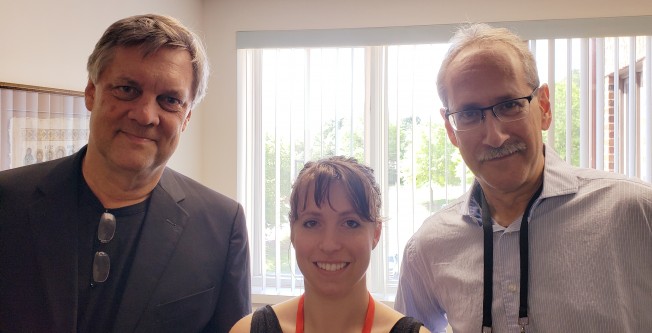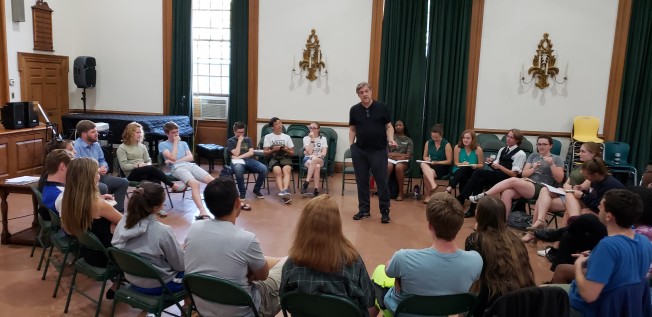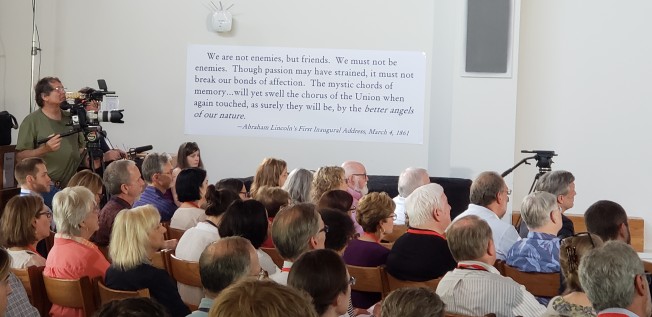Since the 2016 election, researchers have been sounding alarms that public rancor and polarization across the nation have reached a level of intensity not seen since the Civil War. As the Washington Post reported earlier this year, political scientists from several universities found that great numbers of Americans “dehumanize” those who oppose their political views. And in a USA Today article, Lilliana Mason of the University of Maryland remarked that “the nation’s deepening divide has made victory over perceived opponents more valued than the pursuit of common goals.”

David Blankenhorn, founder of Better Angels; April Lawson, who leads Better Angels' parliamentary-style debates and also trains students and adults to chair them; and Doug Sprei, ACTA's director of communications.
Recognizing that extreme divisiveness is the common enemy of democracy, a groundswell of concerned citizens from both parties are joining forces to combat polarization and restore civility and respectful dialogue. To that end, the founders of Better Angels have generated a grassroots movement that is rapidly growing and garnering national media attention.
Launched by David Blankenhorn shortly after the 2016 election, Better Angels is a nonpartisan nonprofit that leads events, debates, and “red-blue” training workshops—all designed to bring conservatives and progressives to the table in civil dialogue. With over 4,500 dues-paying members, new chapters springing up, and more than 150 workshops delivered around the country, the organization is now setting its sights on bringing depolarization efforts to college and high school campuses. To that end, ACTA has begun partnering with Better Angels to help college students gain experience in thoughtful, civil debate and dialogue. The following are excerpts from my conversation in July with David Blankenhorn in New York City. -Doug Sprei
The name “Better Angels” comes from a well-known speech by President Lincoln. What is it about the better angels of your own nature that predicated founding this organization?
David Blankenhorn: When I was growing up in the south, the civil rights conflict and the war in Vietnam were splitting the country. It was a time of deep polarization; and it became important to figure out how we can maintain trust in one another as citizens, and how to speak to one another even across important differences. My family was divided on it. Even as a child, I became really interested in how the two sides could talk to each other. It seeded in me the idea that it was very important to keep conversations going in a good way.
President Lincoln believed this when he spoke those words in 1861, only a few weeks before the firing on Fort Sumter that started the American Civil War. Lincoln pointed to something in us that we could call the better angels of our nature, but what followed was the greatest period of divisiveness in our country’s history. There’s a tragic element there and it tells us that this American experiment of ours can be fragile. We can lose the bonds that connect us, and even reach the point where we dislike each other so much that we may resort to violence or hatred.

David Blankenhorn participating in a debate with high school AP history students, who traveled from around the U.S. to assemble in Middleburg, Virginia for a five-week intensive history camp.
How do you account for the remarkable public response and explosive growth of Better Angels less than two years out of the gate?
Well, we don’t have to talk anyone into believing that this is a serious problem. There are so many people heartsick about where the country is in terms of its political discussion, the infantilization of our public debate, the demonization of one’s opponents, the lack of trust in one another, the name calling, the ugliness and coarseness of it…
Here’s an opportunity where you can reach out across the political divide; you can actually become friends and colleagues with people you don’t agree with. And you don’t have to change your mind about anything political—but in this relationship, you will begin to change your mind about each other. You’ll begin to feel common bonds as citizens; and you may even see common ground that you feel good about working on. If there’s one post-event comment we get from people more than any other, it’s “We’re less divided than we’ve been told.” And that makes people feel better.
When online communication and social media came into its own, the universal assumption was that the internet would be a great equalizer and unifying force. But what we’ve seen is even more extreme polarization—citizens withdrawing to their own information bubbles and digital havens of people who agree with their point of view. How does Better Angels begin to address the dynamics of divisiveness in the 21st century?
We’ve identified in our research about fourteen contributors to current polarization. What you outline in terms of the media ghettos that we can live in now is one of the major contributors, and certainly has got to be near the top of anyone’s list. We call it the “Partisan Media Complex.” And we have principles about this. We’re first trying to model a different way of disagreeing: can we disagree accurately? Because exaggerated or imagined disagreement is really easy. What if we took time to disagree accurately with one another and listened enough so that we could get straight what we actually disagreed on? That would be a huge step forward.

Delegates at the Better Angels Convention in Harrisonburg, Virginia.
Better Angels recently helped students organize a parliamentary style debate at Eastern Tennessee State University. It proved so compelling that other colleges and universities are asking how they can stage similar debates, and we at ACTA are working to facilitate this with you going forward.
When we tried this out in Tennessee, it just lit up the room. It was beautiful. We think it really has enormous potential to attract a lot of students at the college level. One of the wonderful things about this is that with training, students can do this on their own. We train students and they run their own program. This is a grassroots, democratic activity that’s purely voluntary, and you don’t have to raise a lot of money to make it happen.
We are very lucky to have April Lawson on our Board of Directors who advanced this form of debate from the parliamentary debate system, which is foundational in all democracies for public deliberation. It draws from American civic tradition, something as deep as the country itself, and it makes me really proud because it allows students to connect to the deep democratic roots of our country.
It has been inspiring to get into the atmosphere of Better Angels and all the people who are passionate about depolarization. I can tell you the ACTA team looks forward to launching student-run debates with you on college campuses in Washington, D.C. and other cities.
We could not be happier to have the opportunity to work with ACTA because of the relationships you have on campuses around the country—the student leaders, community leaders; it’s just wonderful for us. It will be a great partnership. And you know, it’s one thing for older people to be involved, but it’s also really great to have young people starting out to take on the responsibility of doing better in their generation than some of us have done in our generation—to be part of this civic recovery of trust in one another and feeling like we can be one country again. And I think we have a chance to do that.
The podcast of our full conversation with David Blankenhorn can be accessed on ACTA’s website as well as on iTunes, Spotify, and other podcast channels.


